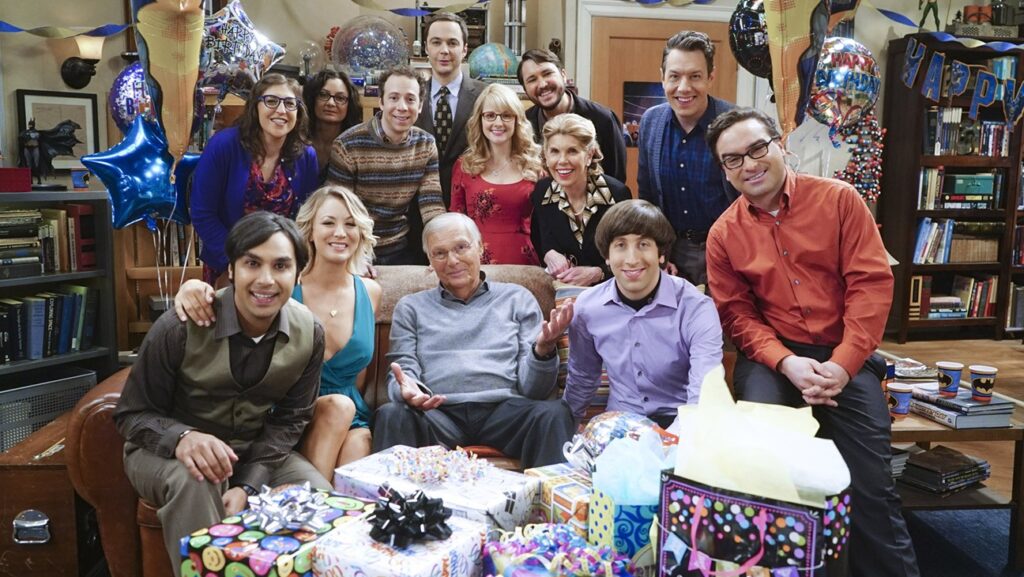
It was a simple yet unforgettable introduction: two awkward scientists stumble across their new neighbor, a glamorous young woman moving into the apartment next door. “Hi,” they mumble in unison, followed by an equally synchronized “bye.” This first encounter kicked off The Big Bang Theory, a sitcom that grew to dominate American television for 12 seasons. While critics often dismissed it for leaning on stereotypes and “geek culture,” it became a cultural phenomenon that hasn’t been matched since its 2019 finale.
Over the years, the traditional sitcom format has fallen out of favor, replaced by single-camera comedies that emphasize intimacy and emotional complexity, appealing to critics and industry insiders alike. The Big Bang Theory’s multi-camera, laugh-tracked style may feel outdated to some, yet its success was undeniable. With a peak audience of 18 million for its final episode, it captivated viewers across demographics, a feat few shows can replicate in today’s streaming-heavy landscape. Since The Big Bang Theory, no single sitcom has achieved such widespread popularity, prompting the question: Was this the last great American sitcom?
Why Sitcoms Like The Big Bang Theory Are Fading
For decades, the sitcom format dominated television, with the genre’s distinct blend of humor, setting, and live studio audience engagement creating some of TV’s most memorable series, from Friends to Seinfeld. According to Evan S. Smith, author of Writing Television Sitcoms, a sitcom thrives on a timely premise, relatable character dynamics, and humor that resonates. Yet as single-camera, cinematic-style comedies have risen, traditional sitcoms have dwindled.

The multi-camera format has struggled to keep up with the immersive storytelling seen in shows like Ted Lasso and Only Murders in the Building, which bring close-ups, emotional beats, and a more film-like aesthetic to the small screen. The last multi-camera show to even receive an Emmy nomination was The Big Bang Theory in 2014, suggesting that industry tastes have moved on.
The Big Bang Theory’s Success and Flaws
When The Big Bang Theory premiered, it was seen as somewhat outdated by industry standards. Yet it quickly proved otherwise, capturing a massive audience with its nerd-culture appeal, quirky characters, and humorous explorations of friendship. The show’s success was fueled by an engaging ensemble cast, including Johnny Galecki, Kaley Cuoco, and breakout star Jim Parsons as Sheldon Cooper, whose socially awkward genius became the heart of the show. Over time, it built a world rich in humor and heart, cementing it as a standout in the genre.
However, The Big Bang Theory wasn’t without controversy. Some viewers criticized its portrayal of women and its use of stereotypes, particularly with Kunal Nayyar’s character, Raj, who struggled to talk to women in early seasons. Nayyar himself acknowledged the limited portrayal of South Asian men on television at the time, noting that he was one of the few actors of South Asian descent in a major American sitcom role.

The show’s writers also adjusted to reflect evolving social attitudes. Eric Kaplan, a long-time writer and producer, admitted that he looks back critically on some of the jokes from early seasons, particularly around gender and social stereotypes. As society progressed, so did the show, becoming more inclusive and nuanced in its humor and character portrayals over time.
Is There Room for a Traditional Sitcom Revival?
With the rise of streaming and fragmented audiences, high viewership numbers are harder to achieve. Actor John Ross Bowie, who played physicist Barry Kripke on The Big Bang Theory, noted that “no one is getting the numbers that Big Bang Theory got anymore” due to the “Balkanization” of television across numerous streaming services.
As new series lean toward innovative formats that blend humor and drama, the classic sitcom format may be fading. Yet every few decades, a series emerges to reinvigorate the genre. Some experts suggest that the sitcom format isn’t necessarily dead, but rather dormant, waiting for the next zeitgeist-worthy series to bring it back into the mainstream. For now, The Big Bang Theory remains a unique chapter in television history, balancing broad appeal with a heartfelt, quirky charm that resonated with millions.